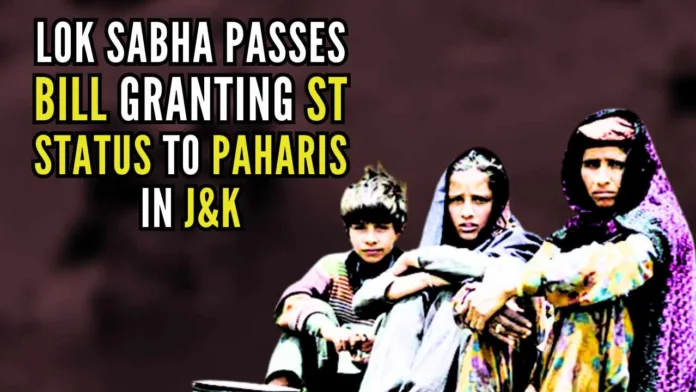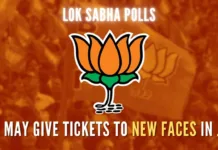
Historic day for J&K as LS clears the Bill to grant ST status to Paharis
Ending the three-decade-long struggle of the members belonging to the Pahari Ethnic group, the Narendra Modi-led government Tuesday gave its nod to the bill granting Scheduled Tribe (ST) status to the Pahari Ethnic Group, Paddari tribes, Koli and Gadda Brahmins.
In addition, Lok Sabha passed two other bills that will give reservations to Other Backward Classes (OBCs) in Panchayats and Municipalities and include Valmikis in the list of Scheduled Castes (SCs). The bills will now be taken up in the Rajya Sabha for consideration and passing.
According to a press statement issued by the Press Information Bureau, Lok Sabha Tuesday passed the Constitution (Jammu and Kashmir) Scheduled Tribes Order (Amendment) Bill, 2024.
“The historic bill aims at empowering the Pahari Ethnic Group, Padari Tribes, Koli and Gadda Brahmins by providing them Scheduled Tribe status. This has been a long pending demand of these communities,” the statement said.
It clarified that the inclusion of these communities in the list of STs will have absolutely no impact on the current level of reservations available to the existing Scheduled Tribe communities such as Gujjars and Bakerwals. They will continue to get reservations like before.
“Reservation to the newly listed Scheduled Tribes will be provided in such a manner that it does not cause any harm to the communities which are already listed as Scheduled Tribes. After the Parliament passes the Bill, the Government of Union Territory of Jammu and Kashmir will issue necessary notifications on the reservation, which will ensure that the people included in the existing list of Scheduled Tribes continue to get the same level of reservation,” the MHA statement said.
In Jammu Lieutenant Governor Manoj Sinha in a press statement said, “A historic day for Jammu Kashmir! Lok Sabha has cleared the Constitution (Jammu and Kashmir) Scheduled Tribes Order (Amendment) Bill, 2024 to grant scheduled tribe status to Paharis, Padari Tribes, Koli & Gadda Brahmin, fulfilling the long pending demand of these communities.
Under the leadership of Prime Minister Narendra Modi, the government has ensured inclusion of these communities in the Scheduled Tribes list will have no impact on the current level of reservations available to Gujjars, Bakarwals& other tribes & they will continue to get reservations like before.
Responding to the debate on the Bill in the Lok Sabha, Union Tribal Affairs Minister Arjun Munda said that with the scrapping of Article 370, the BJP Government has sent out a message that India is one, from Kashmir to Kanyakumari.
The Bill seeks to amend the Constitution (Jammu and Kashmir) Scheduled Tribes Order of 1989 to create separate lists for Scheduled Tribes for the Union Territories of Jammu and Kashmir, and Ladakh.
The Lok Sabha also passed The Constitution (Scheduled Castes) Order (Amendment) Bill, 2024 which adds the Valmiki community as a synonym of Chura, Balmiki, Bhangi, and Mehtar communities in the list of Scheduled Castes in Jammu and Kashmir.
The Bill seeks to amend the Constitution (Jammu and Kashmir) Scheduled Castes Order of 1956, which lists the castes deemed to be Scheduled Castes in the Union Territories of Jammu and Kashmir, and Ladakh.
Replying to a debate on the Bill, Minister for Social Justice and Empowerment Virendra Kumar said there is equality in Jammu and Kashmir after the scrapping of Article 370 of the Constitution, which accorded special status to the erstwhile state.
The Minister said earlier dispensations only used Scheduled Caste people as their vote-bank.
Earlier, the Lok Sabha passed a bill to provide reservations to Other Backward Classes in local bodies in Jammu and Kashmir, with the Government asserting that important changes have taken place in the Union Territory since the abrogation of Article 370 on August 5, 2019.
Replying to a brief debate on the Jammu and Kashmir Local Bodies Laws (Amendment) Bill-2024, Union Minister of State for Home Nityanand Rai said the people of Jammu and Kashmir have started enjoying the fruits of development ushered in by the Government led by Prime Minister Narendra Modi.
Currently, there is no provision for reservation of seats for OBCs in Panchayats and Municipalities in Jammu and Kashmir. The bill seeks to provide reservations to OBC in Panchayats and Municipalities and bring consistency in the local body laws of the Union Territory with the provisions of the Constitution.
“With this, justice will be ensured to the citizens of OBCs in J&K for the first time after 75 years of independence,” according to the statement of objects and reasons of the bill.
BJP aims to consolidate its voter base across the Pir Panjal region
By granting the Scheduled Tribe status to Paharis and others, the Bharatiya Janata Party (BJP) is aiming to further consolidate its voter base across the Pir Panjal region. The BJP is also aiming to exploit the existing fault lines between the Gujjar-Bakarwals and Pahari-speaking population.
The Pahari tribe consists of Muslims, Hindus and Sikhs living in hilly areas of Jammu and Kashmir. Declaring Paharis as a Scheduled Tribe would make them eligible to contest polls on the seats reserved for already notified STs by the delimitation commission.
The Union government has earlier clarified that the reservation of Gujjars and Bakerwals will not be affected while extending ST status to Paharis. But on-ground resistance displayed by a large section of the population has raised many eyebrows.
Out of the nine seats reserved for the Scheduled Tribes in the 90-member Assembly of Jammu and Kashmir, a total number of five seats are reserved for STs in the Jammu division and four in Kashmir.
The Pir Panjal factor
As per the 2011 Census figures of the already notified ST communities, Pahari speaking population is in a majority in Nowshera, Kalakote-Sunderbani, Rajouri (ST), Thanmandi (ST), Surankote (ST), Poonch-Haveli and Mendhar (ST). Darhal (ST) is the lone seat in the Pir Panjal region where Paharis are in a minority as Gujjar-Bakerwals constitute 54% of the population living in the segment.
The BJP has big hopes in Pir Panjal as it managed to win two seats in the region in the 2014 Assembly elections. It then won the region’s lone Hindu-majority seat of Nowshera and Muslim-dominated Kalakote seat, where a combination of Gujjar and Hindu votes worked in its favour.
The Pir Panjal region is a Muslim-majority region with a substantial Hindu population. While the Rajouri district has a 34.54% Hindu population, Poonch has a 6.84% Hindu population. The other communities to get ST status in J&K are the Paddaris, Gadda Brahman, and Koli tribes. The grant of ST reservation to Paddaris will benefit the BJP in Kishtwar district, where a predominantly Hindu-majority seat of Padder-Nagseni was carved out in the delimitation exercise. As per the 2011 census figures, the Padder sub-division has 83.63% Hindu population, 9.46% Buddhists, and 6.84% Muslim population.
Balance tilted towards the Jammu region
By adding more tribal groups to the ST list, the BJP is aiming to widen its support base across the Jammu region, especially in the Chenab valley and Pir Panjal regions. Statistics reveal that more than 60% of the Pahari-speaking population in Jammu and Kashmir is currently living across the Jammu region. By including Paddaris, Gadda Brahman and Koli communities, the BJP is surely adding to its voter base to counter opposition parties. Among the 15 new social groups being added to J&K’s social caste list (OBC), 12 are from Jammu.
What is the apprehension of Gujjars-Bakerwals?
Despite clear-cut assurances, the members of the Gujjar-Bakerwal community are apprehensive that Paharis and others will be given reservations from their allotted 10 percent quota. The community asserts that Paharis are mostly well-off and upper-caste Muslims, Hindus, and Sikhs who are not a tribal group and do not need reservation benefits. ST status to Paharis will deal a lethal blow to the Gujjars and Bakerwals who will be further pushed to poverty. They claim that it will also make Gujjar identity vulnerable and open up institutions built over the years for Gujjars for non-tribals.
Note:
1. Text in Blue points to additional data on the topic.
2. The views expressed here are those of the author and do not necessarily represent or reflect the views of PGurus.
For all the latest updates, download PGurus App.
- Assembly polls in Jammu and Kashmir soon: Modi - April 12, 2024
- Campaign trail: Udhampur-Doda Lok Sabha seat - April 8, 2024
- Ghulam Nabi Azad returns to the poll arena, to contest the Anantnag-Rajouri Lok Sabha seat - April 2, 2024









